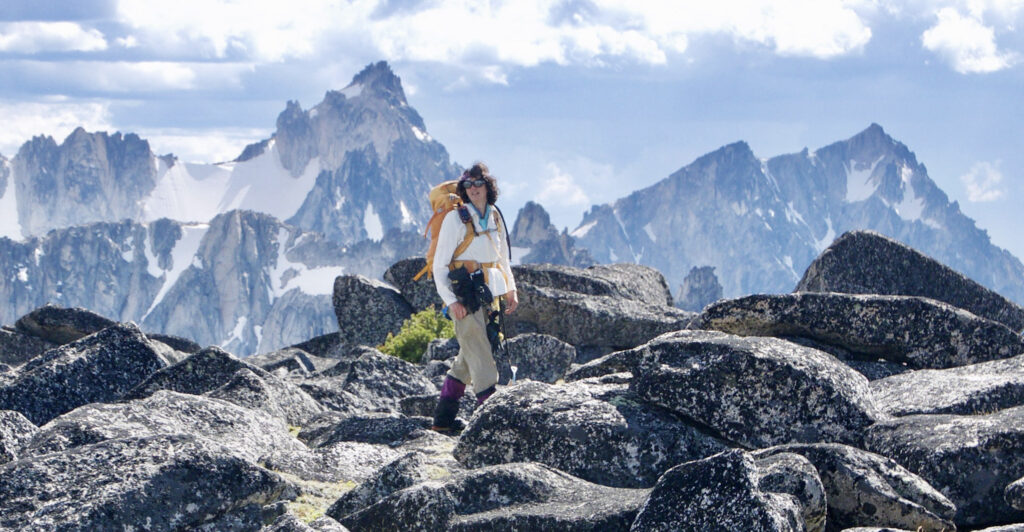IN MEMORIAM
Ann Nelson

This memorial obituary was originally published by the Seattle Times, (2019) here.
Ann Nelson loved a challenge. From becoming an accomplished physicist in a field dominated by men to summiting mountains, Dr. Nelson spent her life focused on the next goal — and on giving others a hand along the way.
She was backpacking with her husband and two friends in the Alpine Lakes Wilderness area in the Central Cascades when she died, said her husband, David Kaplan. Dr. Nelson, 61, had always wanted to take that route up Necklace Valley and across West Fork Foss River Valley. It was supposed to be a leisurely trip as opposed to their typical climbing and scrambling.
On Sunday, as the group was crossing a narrow path with loose rock coming off Iron Cap Mountain, Dr. Nelson lost her footing and fell. She had died by the time Kaplan reached her, he said.
By Monday, Kaplan had received hundreds of messages from people around the world. Members of the Washington Hikers and Climbers Facebook group, which Dr. Nelson moderated, recounted how she helped them connect to the outdoors. Young women and people of color told Kaplan how Dr. Nelson, a physics professor at the University of Washington, had inspired them to pursue physics and helped them get jobs.
“She was just an incredibly warm and caring person who was absolutely brilliant at the top of her field,” said Kaplan, who is also a UW physics professor. “She cared a lot about social justice, and she was an inspiration by example.”

Physicist Ann Nelson hiking on Cascade Mountain.
As chair of the graduate program, Dr. Nelson worked to increase diversity in the department, including by speaking out about the lack of diverse faculty.
“She was a brilliant theoretical physicist. That’s what she’s most known for,” said Laura Segala, one of Dr. Nelson’s sisters. “But she’s also a very kind person who really stood up for people who were marginalized or others she felt were overlooked.”
Dr. Nelson grew up in Lafayette, California, where she was valedictorian at Acalanes High School. Her teachers and peers “balked at the idea of a female physicist,” but Dr. Nelson focused on learning as much as she could about the subject, even taking college physics classes while in high school, according to a newsletter from Harvard University, where she would later study.
She earned her bachelor’s degree in physics at Stanford University, where she met Kaplan when they were both 19. The two had been “soulmates for 42 years since,” Segala said.
Dr. Nelson went on to work at the largest particle physics laboratory in the world, operated by the European Organization for Nuclear Research (CERN) in Geneva, Switzerland. She studied under renowned physicist Howard Georgi at Harvard University, where she received her Ph.D. in 1984.
After a few teaching stints at other universities, she ended up at the University of Washington’s physics department in 1994, along with Kaplan, who is the former director and current senior fellow at the Institute for Nuclear Theory.
At UW, Dr. Nelson continued to advance in her field. She received a Guggenheim Fellowship in 2004, was elected to the National Academy of Sciences in 2012 and was awarded the 2018 J.J. Sakurai Prize for Theoretical Particle Physics for research the selection committee called “groundbreaking.” She served on committees for the U.S. Department of Energy, CERN and the Stanford Linear Accelerator Center.
“Her scholarship, service and dedication to her students and colleagues will be deeply missed,” university spokesman Victor Balta said in an emailed statement.
Besides being a “rock-star physicist,” Dr. Nelson was also known by colleagues and students for passion for diversity in science, said UW graduate student Jesse Stryker. Dr. Nelson offered Stryker a fellowship for students from diverse backgrounds and made him feel welcome at the university.
“She was always encouraging, even though I lacked confidence at the time,” Stryker said. “She made me feel like I was adequate and that I should pursue the things I’m interested in without worrying so much.”
UW physics professor Anna Goussiou was also taken under Dr. Nelson’s wing. Goussiou said she spent Thanksgivings at Dr. Nelson’s home each year until she got married, along with others from the physics department who didn’t have family nearby.
Dr. Nelson’s sister said she lived vibrantly and focused her energy on the people around her and teaching herself new skills, from painting to wildflower identification.
“She was one of those people who never really watched a lot of TV. The time most of us waste on that, she was always doing things and doing them well,” Segala said. “I hope people remember how much she loved being alive.”
Dr. Nelson is survived by her husband and their two children: a daughter who recently graduated with her master’s degree in computer science and a son in college. Dr. Nelson is also survived by her two younger sisters and parents.

Positions Held
General Member, 1992 – 1997 & 2017 – 2019